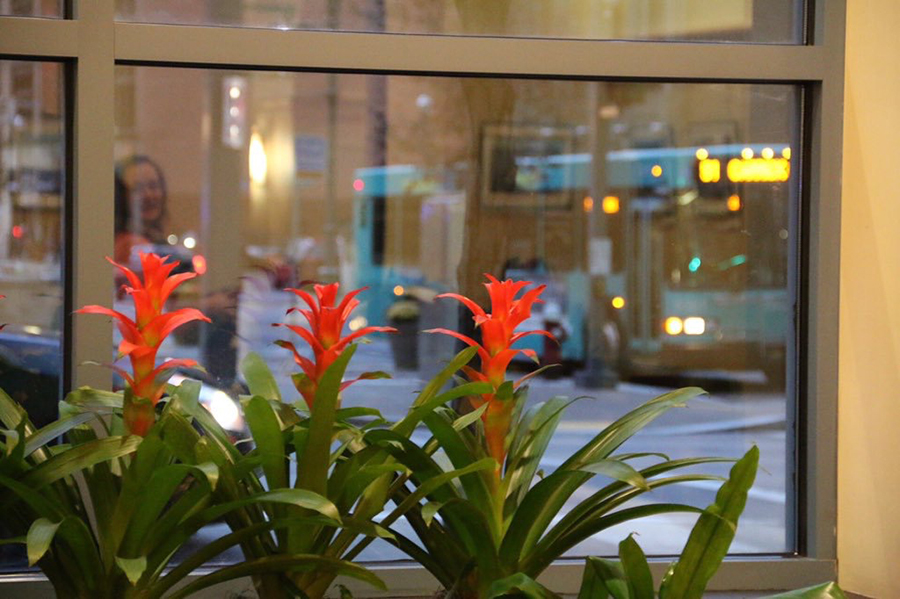Point Park students call for U-Pass deal after Port Authority renews agreement with Pitt, Chatham
Administration says that the associated costs could create roadblock to potential agreement between Point Park and Port Authority
Photo by Nikole Kost
October 6, 2021
With an agreement renewed by two local universities for their campus communities to continue using public transit at no personal cost, Point Park students have questioned why the university has failed to re-negotiate a similar agreement, but the university has said that a resolution will not be that simple.
On Sept. 25, 2021, the Allegheny County Port Authority board renewed a five year agreement with local higher education institutions, including the University of Pittsburgh and Chatham University, in continuation of the U-Pass program with Port Authority transportation.
The full U-Pass program currently grants those students, staff and faculty associated with “institutes of higher learning” to access any Port Authority buses and light rail services for free while other institutions, like Point Park, have opted for discounted rates at particular times and specific days. Both options require that students, faculty and staff provide a valid campus ID, according to the Port Authority’s official website.
“The no cost U-Pass would really benefit Point Park,” Jacob Palmer, an SAEM major at Point Park said. “It helps students get to internships, co-ops, or just provides them with access to see the city.”
Currently, the Port Authority website lists the University of Pittsburgh, Chatham University and Carnegie Mellon University as part of the program.
“It’s long overdue to at least get this process started,” Marc Palombo, a theatre major and senator for the Student Government Association (SGA) at Point Park, said. “I don’t think we have done that good of a job putting this issue towards the administration.”
Point Park, along with Carlow University and Robert Morris University, are among the universities that are only discounted on Port Authority transportation, having to pay $1 cash with proof of an unexpired university-issued ID after 7 p.m. on weekdays and all-day on weekends and certain holidays, according to the Port Authority website.
Currently, there have been no current known negotiations between the administration at Point Park and the Port Authority following the University of Pittsburgh’s and Chatham’s University renewed agreement. However, Palombo as an SGA senator, has pushed for a renewed negotiation with the Port Authority that is similar to the University of Pittsburgh’s.
“I’m still gathering information at the moment about past negotiations and meetings about the program,” Palombo said. “I’m currently trying to talk to Pitt students, contacting the Port Authority offices, and other SGA members about information pertaining to this and Point Park’s involvement.”
Although the U-Pass program provides benefits to students, faculty, and staff who are part of the program, the University of Pittsburgh and Chatham currently pay 50% of the base fare, or $1.25 per trip under the original 2012 agreement. With the renewal, however, both universities will pay close to 60% of the $2.75 base fare for trips taken this year, according to WPXI News.
The percentage that current institutions pay the Port Authority is expected to increase by 3% for the next five years which, according to KDKA News, will result in institutions paying close to 72% of base fares for transportation by 2026.
“The process is not really free,” Helen Fallon, a professor emeritus in the School of Communication at Point Park, said. “When the program first started, it was free until it became too costly for the Port Authority, they needed to make some revenue, so they needed payment from the universities under the program.”
When the U-Pass program was proposed before at Point Park, Vice President of Student Affairs Keith Paylo said not everyone has been in favor of the university entering the program.
“The reason for mixed reaction, when it has been asked in the past, has been the cost associated with the program that would be passed on towards individuals,” Paylo said. “It would be hard to estimate how it would exactly cost until we assess the number of individuals who would participate within the program.”
The U-Pass program itself has become financially profitable for the Port Authority, bringing in millions for nearly nine million riders as of 2019, according to WPXI News.
“This is something that has been discussed for decades now,” Fallon said. “ It’s something that has come up time and time again and it’s very difficult to work with the Port Authority. I don’t want students to think that the administration and student government in the past haven’t tried to resolve this.”
The Port Authority currently plans to approach other academic institutions within the Pittsburgh area after finalizing current participants, including Point Park.
“Now that the agreements with the initial U-Pass institutions are finalized, we plan to approach other institutions within our region. That would include Point Park,” Adam Brandolph, a spokesperson for the Port Authority, said. “We are currently waiting until our mobile ticketing system is installed and activated on the light rail system before we start those conversations, since that will be the method of payment for additional U-Pass agreements.”
As of 2019, it was estimated that 54.1% of people within the Pittsburgh area relied on their own personal vehicles to get into the city, according to Data USA. Although many residents rely on their own vehicles, 17.3% of people do rely on public transit as their main source of transportation for work and school, while 11.3% walk.
At this time, a proposal is planned to be drafted by SGA to be presented in front of the administration to discuss future development of the program at Point Park.
“This is something I know will be difficult to tackle,” Palombo said. “Point Park is in the heart of downtown, there has to be some kind of room for negotiation.”


















